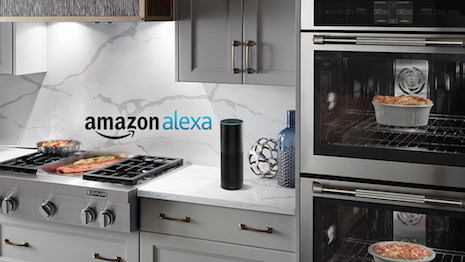- About
- Subscribe Now
- New York,
March 21, 2017

 Jenn-Air Connected Wall Oven controlled by Amazon's Alexa
Jenn-Air Connected Wall Oven controlled by Amazon's Alexa
With the growth of digital assistants such as Amazon's Alexa and Google Home expecting to reach more than 1.8 billion consumers by 2021, the luxury landscape is open for a multitude of capabilities by integrating with this technology, illustrated in a new report from iProspect and Bing.
High-end automakers as well as numerous other luxury brands have been continuing to integrate with digital assistants as the experience exudes opulence, catering to affluent consumers. According to Digital Assistants: Reordering Consumer Lives & Redefining Digital Marketing, currently more than 500 million individuals use some version of a digital assistant, which makes it imperative for luxury brands to stay ahead of the curve now that it has become universal for consumers across the board, and not just the affluent.
"When we look back at how the the mobile revolution ushered in an entirely new consumer behavior, voice-based interaction with a digital assistant represents a major evolution of that magnitude," said Andrea Wilson, vice president, strategy director and luxury practice lead at iProspect, Forth Worth, Texas. "It's so much more than an additional connection point for marketers.
"Digital assistants are changing the way we find information, and permanently altering the way we communicate," she said.
Examples of integration
Apple Siri, Google Assistant, Amazon Alexa and Microsoft Cortana currently dominate the digital assistant space as the most used.
Many brands are tapping into the potential of these tools by integrating their products with the virtual assistants. For instance, appliance maker Jenn-Air added voice control capabilities to its wall ovens, furthering its promise to deliver a seamless cooking experience.
Announced at the Architectural Digest Design Show in New York March 16, Jenn-Air’s user-friendly voice command feature will be powered by a “Skill” application for Amazon’s AI device Alexa. Connected homes are the future, and introducing appliances that offer AI assistance and features will keep a brand’s cutting-edge position (see more).
Also, British automaker Land Rover ushered in a first for London's Design Museum, as it unveiled its fourth Range Rover model and began a new partnership.
Range Rover Velar
The new Range Rover Velar was the first vehicle to be unveiled at the Design Museum in London, which reopened in November 2016 after moving from its original location. Velar is the latest Range Rover model and will host a suite of technological features that will act as a butler for drivers (see more).
AI assistant possibility
Brands can garner a wide range of information about individuals by tapping into these digital assistants.
Ad-spend on these platforms will continue to grow as advertisers learn to use these tools in the most accurate manner. By 2021, ad-spend is likely to reach $12 billion, as marketers continue to attempt to become a part of consumers everyday lives.
Bing and iProspect's report mentions that Forrester has noticed that the use of digital assistants is growing far beyond millennials, with many over-50 consumers leveraging the technology as well.
The popularity of these virtual assistants is likely because the technology is growing as well. In the past, speaking with an AI assistant could be frustrating and hardly resembled human interaction.
Advances in technology have helped craft a more natural experience, with many assistants recognizing most commands and interactions.
Google Home and Mercedes
Marketers and manufacturers of these virtual assistants are working to keep the on-going conversation in mind. It is important that marketers realize that the consumer relationship with the digital assistant is not just a series of touchpoints, but an ongoing set of touchpoints.
For instance, if a user asks a digital device how long it will take to get to a location and follows up with an inquiry regarding hotels, the device should recognize the question is related to the previous one and look for hotels in the aforementioned area.
The report references research from the research firm Gartner, showing that by 2020 almost 30 percent of Web browsing will be screenless.
"While I knew that voice search was becoming more popular, I was surprised to learn that voice is quickly becoming the search method of choice," Ms. Wilson said. "Half of all searches will be voice searches by 2020.
"This will substantially impact marketing strategy and advertising dollars," she said.
Share your thoughts. Click here